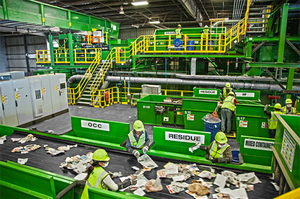April 1, 1999
Markus Schroll and Erich Staudt
Germany is one of the leading nations in managing solid waste, especially in recycling packaging waste. However, the country's Packaging Ordinance and the recovery organization Duales System Deutschland (DSD) have come under fire for being ecologically and economically unreasonable, despite achieving the mandatory recycling quotas, according to a regulatory impact analysis conducted by the Institute for Applied Innovation Research (IAI), Bochum, Germany.
Germany's high recycling quotas have led to high cost, according to IAI. To fulfill the Packaging Ordinance's regulations, DSD has had to build up collection systems throughout Germany - collecting every milk carton from every small village, according to the research organization.
This has led to enormous logistics and sorting costs to the consumer and the country, as well as reduced markets for recyclables. Under DSD, waste management costs can total more than DM 3,000 per ton (U.S. $1,800) compared to an average of DM 650 per ton (U.S. $400) for incineration.
Consumers consequently are confused and burdened by the increasing requirements different isolated collection systems, such as lightweight packaging, glass, paper, compost and batteries - use to recycle, according to IAI's report. Poor education and low motivation to re- cycle has led to incorrect packaging separation.
In Frankfurt, for example, the percentage of garbage (non-packaging waste) by weight in DSD collection averages between 60.1 percent and 92.9 percent.
This also has resulted in poor-quality end products. For example, co-mingled collection of newspapers, magazines and paper/cardboard packaging has increased the amount of low-quality waste paper.
Furthermore, DSD has had to subsidize plastics recyclers. In 1996, the organization provided DM 515 million (more than $300 million U.S. dollars) in subsidies for plastic recycling (excluding collecting and sorting) because secondary raw materials and products are not competitive.
Secondary plastics granulate is DM 3,000 to 3,500 (U.S. $1,800 to $2,100) per ton - more than twice the price for virgin plastics.
To finance DSD's work, license fees of more than DM 4 billion (U.S. $2.4 billion) were paid in 1997, primarily by consumers through increases in product prices.
Before being collected by DSD, used sales packaging has to be presorted, cleaned, stored and transported by consumers themselves. IAI cautiously estimates that the annual cost for these activities equals more than DM 3 billion (U.S. $1.8 billion).
Incineration and landfill costs also are higher because of lower disposal quantities. High fixed costs and increasing environmental regulations have forced disposal facility owners to increase their charges.
IAI also estimates that administrative tasks such as contract implementations and settlements with DSD cost at least DM 2 billion (U.S. $1.2 billion) per year.
On the bright side, the Packaging Ordinance's recycling targets have been fulfilled: In total, DSD has collected more than 5.6 million tons of packaging in 1997, although 2.5 million tons already were being collected before DSD. This recycling amount would have continued to increase to at least 3.6 million tons without DSD according to IAI's analysis. If these estimates are accurate, only 2 million tons can be attributed exclusively to DSD at a cost of more than DM 9 billion (U.S. $3 billion) per year.
Furthermore, regional packaging waste monopolies have evolved because of the mandatory liability for harmonization between a dual system and the public municipal authorities, according to IAI. As a result, large waste management companies have secured the lion's share of the DSD contracts for 10 years.
In conclusion, IAI questions the economic viability as well as the ecological benefits of Germany's DSD, especially for small used packaging wastes or composites that are difficult to separate. It refers to life cycle analyses, which conclude that other methods, such as incineration, especially if the plants are thermal power stations that are integrated into power and heat supply networks, represent useful alternatives.
IAI recommends an integrated solid waste management approach, based on evaluations of the economic, environmental and social effects of different waste management options.
An English summary of the analysis, "The German Packaging Ordinance: Questionable effects of a fragmentary solid waste management approach," can be ordered by e-mail or fax from IAI. Institute for Applied Innovation Research (IAI) e.V., Buscheyplatz 13 D-44801 Bochum, Germany. Phone: (49) 234/9 71 17 0. Fax: (49) 234/9 71 17 20. E-mail: [email protected] Website: www.ruhr-uni-bochum.de/iai
You May Also Like


